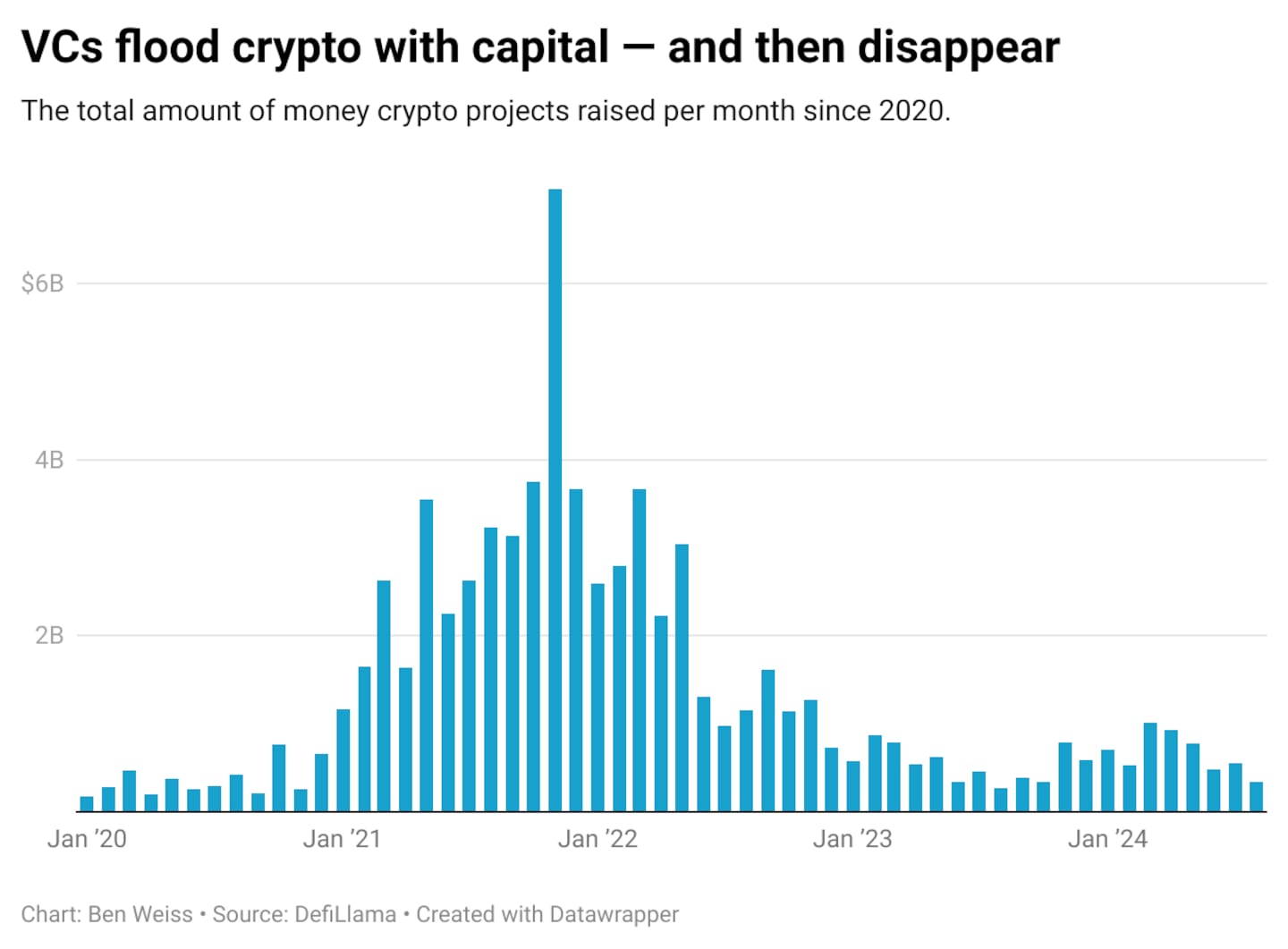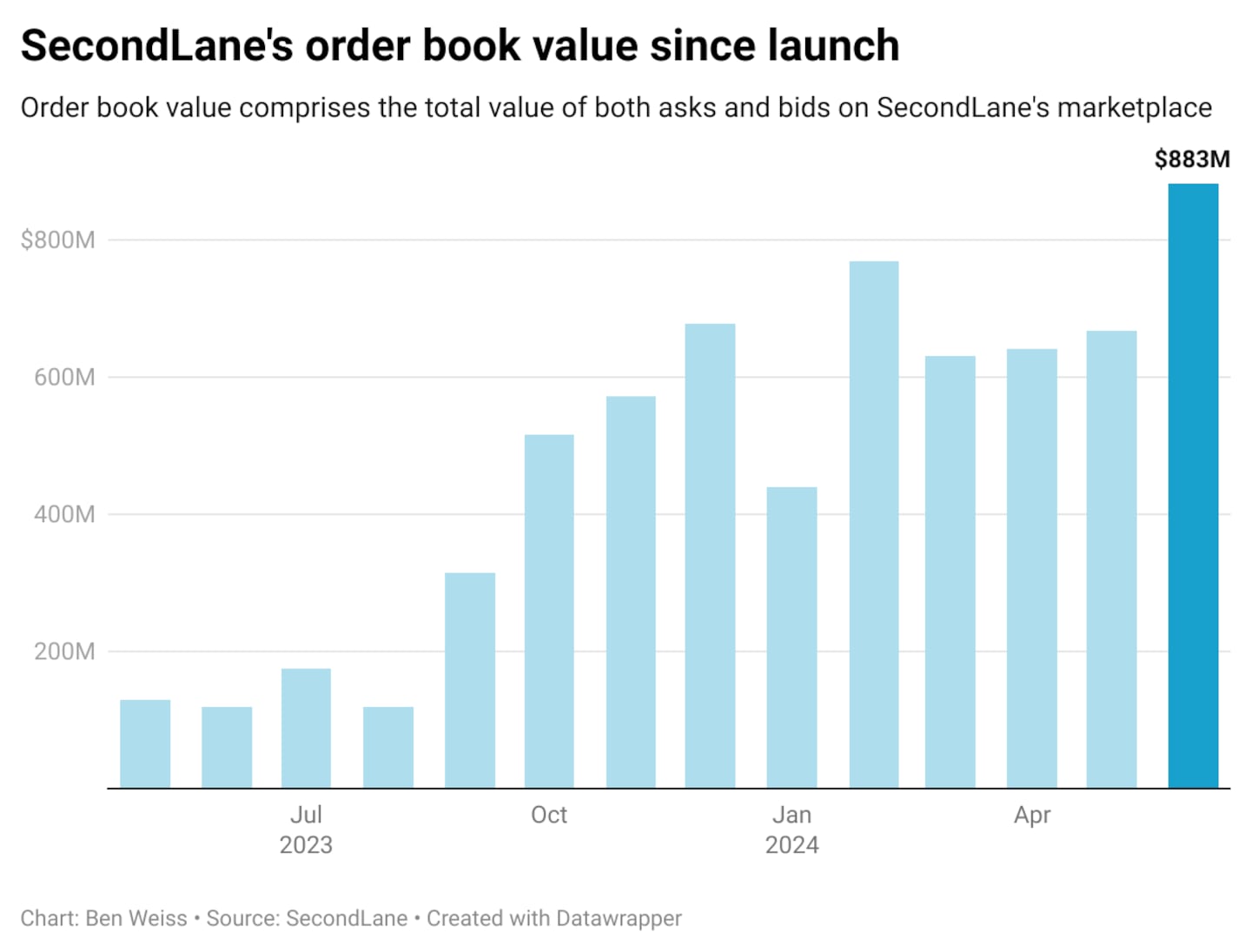- Investors have often traded tokens and equity in private Telegram chats.
- Now, startups are making millions launching bespoke products to do the same.
- Making these deals public won't make everyone happy, however.
Secondary markets in crypto — where investors privately buy and sell their stakes in companies as well as locked tokens — are on the up and up.
Since May 2023, activity on SecondLane, one of the largest secondaries marketplaces, recorded a 631% increase in activity.
The monthly value of its order book, or a record of asks and bids for company assets, has grown to almost $900 million as of July.
So, what’s driving so much activity in such an illiquid and opaque market?
A recent influx of venture capital, growth in private markets writ large, and the emergence of novel assets investors can’t sell through run-of-the-mill financial institutions, say insiders.
“You put a lot of private capital into a new market, you wait a few years, and undoubtedly a few of these investments will want to try and get early liquidity,” David Mirzadeh, who founded secondaries market Bulletin in June 2023, told DL News.
Backroom token deals
Secondaries are traditionally illiquid markets where brokers manually find buyers and sellers for startup stock and other assets between different investment rounds.
Still, it’s a fast-growing niche of global capital markets.
The volume of completed secondary deals more than quadrupled from 2013 to $115 billion in 2023, according to a recent report from BlackRock. And, while the global amount of private fundraising fell year-over-year in 2023, it’s still doubled over the past decade to almost $1.05 trillion in 2023, per McKinsey & Company.
Deal activity is now picking up in crypto thanks to the influx of capital investment over the last few years.
At their peak, crypto projects raised a record $7.1 billion in November 2021, per data from DefiLlama, from some of the bigger names in venture capital, including Andreessen Horowitz and Tiger Global.
When the bear market hit in full after the collapse of crypto exchange FTX, VCs hoping for an exit — selling their equity in a private startup or waiting for a token launch to do the same — found themselves staring at months of no returns as projects delayed launching new cryptocurrencies, said Mirzadeh.
Funds needed to sell tokens; locked tokens or stashes of cryptocurrency released to holders at designated dates; and “simple agreements for future tokens,” or SAFTs, an equity-like agreement that promises a holder tokens once a cryptocurrency goes live.
While crypto has attracted brand-name VCs, financial institutions like Forge Global and Goldman Sachs, which have traditionally acted as secondary brokers for traditional markets, haven’t entered the fray.

These institutions don’t deal with these assets Jan Strandberg, co-founder and CEO of Acquire.fi, told DL News.
“Forge doesn’t deal with tokens at all,” he said, referring to heavyweight secondary broker Forge Global. “They just deal with equity.”
Meeting new demands
Now, crypto-native platforms, like SecondLane, Acquire.fi, Bulletin, and offx have sprung up to meet demand.
And business is roaring.
Strandberg, who launched Acquire.fi in 2022, said as much as 80% of his platform’s volume is token-related.
Jonas Thiele, the co-founder and CEO of offx, said that his company facilitated roughly $600 million in secondary sales since it launched in December 2023. He’ll open the invite-only marketplace to more people later this year.
There’s a waitlist for his platform, but he plans to open up to the broader public later this year, Thiele told DL News.
These companies aren’t just serving a new market; they also match buyers and sellers much differently than traditional brokers.
Secondaries 2.0
Mirzadeh, whose full-time gig is as chief of staff of the NEAR Foundation, used to work at Goldman Sachs and helped broker secondary market deals.
“You realise very quickly how manual and archaic the whole process is,” he said, in reference to executing secondary sales for Goldman’s clients. “There is not really that much automation to speak up. Everything is done very manually.”
Originally, private, over-the-counter deals between crypto investors weren’t much different.
They were usually brokered through word of mouth or over Telegram, crypto’s messaging app of choice.
“It was like trying to close a deal in a crowded room, where everyone had a slightly different version of the facts.”
— Jonas Thiele, co-founder and CEO of offx
Thiele says that’s been problematic.
“There were instances where four to five brokers were involved in a single transaction, leading to fees that could add up to 25% of the total volume,” he told DL News, referring to an unnamed deal worth $2 million.
Thiele said that the construct also meant information between brokers and investors could be misunderstood or not shared.
“It was like trying to close a deal in a crowded room, where everyone had a slightly different version of the facts,” he said.
Telegram chats still dominate the secondary market, but some are now automated. Secondlane, offx and Acquire.fi have channels that post daily bids and asks.
Lifting the market veil
These platforms are lifting the curtain on what has historically been a very opaque market. Nick Cote, the co-founder and CEO of SecondLane, a marketplace for crypto secondaries launched in May 2023, thinks more transparency is inevitable.
“The era of privacy and data compartmentalization is unfortunately behind us,” he told DL News, adding later: “Good luck keeping all of this stuff private.”
SecondLane and Acquire.fi, publicly post deals online and act as go-betweens for buyers and sellers to connect.
Others, like Bulletin, aggregate data from secondary trading platforms, crypto brokers, and user-sourced information.
“What we’re trying to do is take a lot of what exists already in the traditional space — in terms of private market solutions, private credit, — and bring that to the digital asset space,” said Cote.

‘Growing pains’
Anyone can join Secondlane and Acquire.fi’s running tally of deals, perhaps to the chagrin of some founders or investors who don’t want it publicly known that their companies are trading at a fraction of their most recent valuation.
Cote from Secondlane understands that it’s a bitter pill to swallow.
“If you have portfolios that haven’t been marked in years, and they’re pricing these things where they’re not even close to in reality, there’s going to be some growing pains there,” he said.
However, he believes projects like Secondlane are ultimately a boon for the crypto industry.
It’s better to realistically tell investors about the value of one’s portfolio now rather than kick the can down the road when it may be worth even less.
“It’s a new paradigm shift that is going to take some swallowing,” he said.
Ben Weiss is a Dubai Correspondent at DL News. Liam Kelly is a DeFi Correspondent for DL News. Got a tip? Email them at [email protected] and [email protected].
